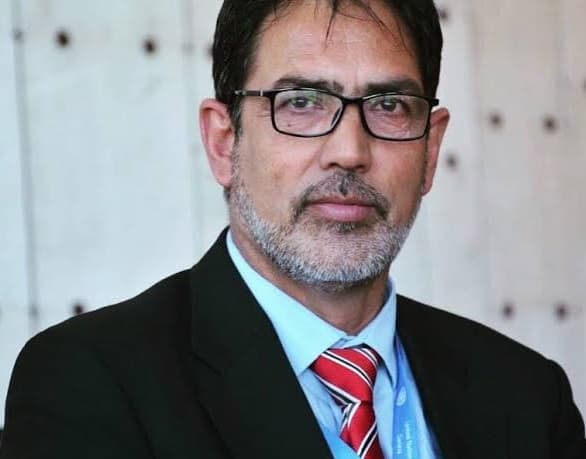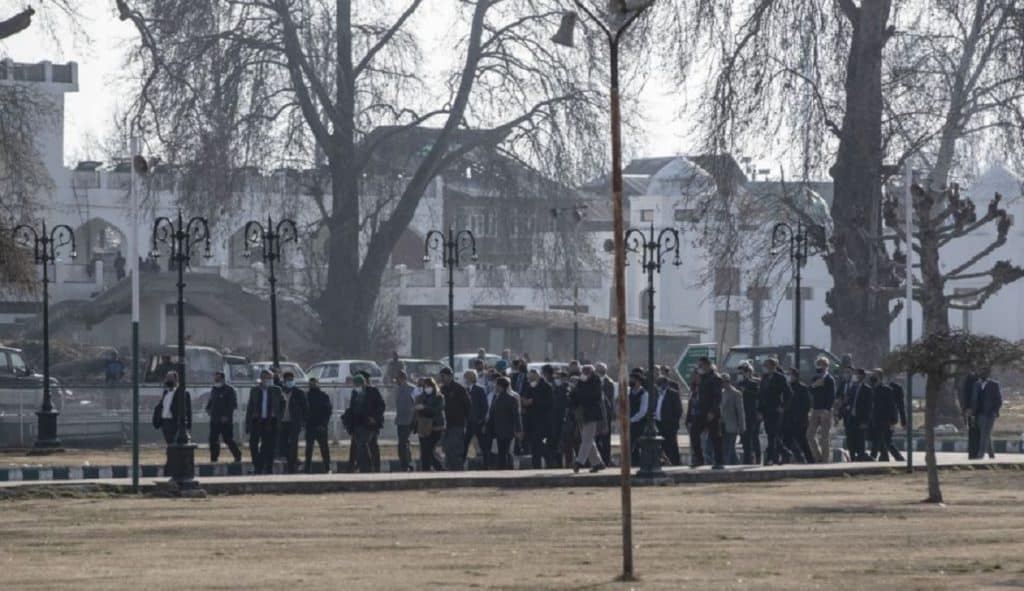By Altaf Hussain Wani (Chairman, Kashmir Institute of International Relations – KIIR)
After a yearlong hiatus the Indian government yet again arranged a trip of foreign envoys to the occupied territory of Jammu and Kashmir. The guided tour is widely viewed as an Indian ploy to keep the charade of normalcy alive to convince the world that all is well in Kashmir.

This is probably the third visit by a group of foreign diplomats stationed in New Delhi since the Indian government led by Narendara Modi stripped the region of its semi-autonomous status in August 2019 and enforced the change by subjecting a population of over 14 million to a harsh crackdown coupled with a complete communications blackout. This time around over a two-dozen diplomats, mostly from European and African countries were invited for a curated visit to the region to help India project it’s “all is well in Kashmir” narrative and to ward off the growing calls for an independent probe into human rights violations. It has been more or less a replica of the past visit wherein the delegates were taken on a brief tour of “Naya (new) Kashmir”, which was skillfully carved-out from the war-torn city overnight and decorated as per the visitors’ contentment by removing temporarily the barricades, barbed-wires and bunkers that one can normally see dotted all around the city.
The delegates, however, met a bunch of very less-known hand-picked people, who played a double role as ‘public representative as well as cheerleaders’ to greet the visitors. Not even a single prominent political, trade or civil society group was invited by the authorities to meet the 24-member foreign delegation during its New Delhi-controlled two-day visit to the territory. As usual the delegates were taken to boat-ride in picturesque Dal-Lake. Interestingly, the visiting delegation did not even care to venture out of the comfort zones to have a glimpse of the real Kashmir that remained largely shut on the occasion.
No efforts whatsoever were made to meet common people on the streets of Srinagar to have a firsthand knowledge of the actual situation the people of Kashmiri have been stuck in for the past several years. Barring a few official briefings, delegates were not allowed to meet the main political stakeholders. No meeting was sought with human rights activists, members of the civil society and the political leaders. Not to talk of Hurriyat the so-called mainstream political leaders were ridiculously ignored.
This is what has made the visit highly controversial besides drawing serious criticism from political leaders from across the political spectrum. Other than the Hurriyat (pro-freedom camp) the mainstream politicians including former chief Ministers Jammu and Kashmir Omar Abdullah, Ms Mehbooba Mufti and Senior Congress leader Professor Saifudin Soz expressed their strong resentment and anger against the EU envoys planned trip to Kashmir saying that such “guided tours” would serve “no purpose”.
“We’ve seen these guided tours in the past particularly, in the immediate aftermath of August 5, 2019. They serve no purpose because the visiting delegation is allowed to meet only hand-picked individuals. If this proposed delegation is going to do the same thing, this visit will be as pointless as previous ones. Mr. Abdullah told news men in Srinagar.
The former chief minister of Jammu and Kashmir and PDP chief, Mehbooba Mufti while reacting to the ongoing visit of a delegation of European Union envoys to J&K said, “Delegations will come and go but the situation in Jammu and Kashmir is not good. The approach that has confined the movement of Jammu and Kashmir’s leadership is not good. We are being caged in our own homes,” the PDP chief told reporters on the sidelines of her visit to north Kashmir’s Kupwara.
Hurriyat leaders and organizations, who have appealed to the masses to observe complete shutdown on foreign envoys tour to the region, made it clear that “Curated tour of foreign dignitaries to showcase normalcy in the valley to the outside world is misleading”.
While on the other hand deserted streets, shuttered shops and an absolute silence in the valley on the occasion was yet another gentle reminder to the international community that what Indian government wants to sell as “normal” is nothing but a travesty of truth and justice. The silent protest was an eye-opener for is an eye-opener for New Delhi in particular the visiting team of European envoys.
One hopes that this silence of lurking death witnessed by the visiting delegates would stop them from becoming a mouthpiece of the Indian state that has brazenly violated the UNSC resolutions and other international laws by usurping fundamental rights of the people of Kashmir.
It is for sure that India would use this visit to achieve its strategic objectives. The question, however, is whether they (foreign dignitaries/envoys) will allow the Indian state to get themselves used as tools to give legitimacy to the illegitimacy?
Will they allow the Modi led regime to use them as its ‘brand ambassadors’ to project its baseless normalcy narrative without giving an iota of importance to wishes and aspirations of the Kashmiri people?
But apart from India’s policy of deceit and deception, what exactly the world needs to know about Kashmir is that it has been classified as the world’s most militarized zone as well as the largest region occupied by Indian forces illegally. It happens to be the largest open jail on the surface of the earth, where Kashmiris feel literally caged in their own houses; where they live without human rights.
The world needs to know that India has made Kashmir a living hell for its people where they feel exiled in their own homeland, they feel robbed of their rights and identity, they cannot even mourn the death of their loved ones killed in fake encounters, they cannot even eat the food of their choice, cannot complain or support the victims of oppression, cannot raise their voice against the reckless state violence, they cannot share a tweet, cannot publish a post on Facebook, cannot have an opinion despite being an expert in field and cannot do anything creative without attracting an FIR. Journalism in Kashmir is in a state of repression, journalists cannot write the truth or publish stories without the government censorship. The people in Kashmir live in a constant threat of settler colonialism.
Unfortunately, this is what defines the life in the BJP’s so-called Naya Kashmir today. Would the government of India dare to showcase this shocking and dreadful aspect of life in Kashmir to the world? If the BJP government is really sincere and serious in showing what it has done for Kashmir and the Kashmiris there is perhaps no better option for it other than accepting the UN offer and allowing its fact-finding mission to visit the region to assess the situation in the region.
And let it be known that holding curated visits of selected envoys and making them to tour a particular area in Kashmir and arranging their meetings with hand-picked people of their own choice and taking them to a boat-ride in picturesque Dal Lake won’t really change the reality and the situation on the ground. And the reality remains that Kashmir is a political issue that needs to be resolved in accordance with the universally accepted principle of right to self-determination.
Author: Altaf Hussain Wani, Chairman of Kashmir Institute of International Relations and Vice chairman JKNF.
(The views expressed in this article belong only to the author and do not necessarily reflect the views of World Geostrategic Insights).
Image Credit: AP Photo/Mukhtar Khan







